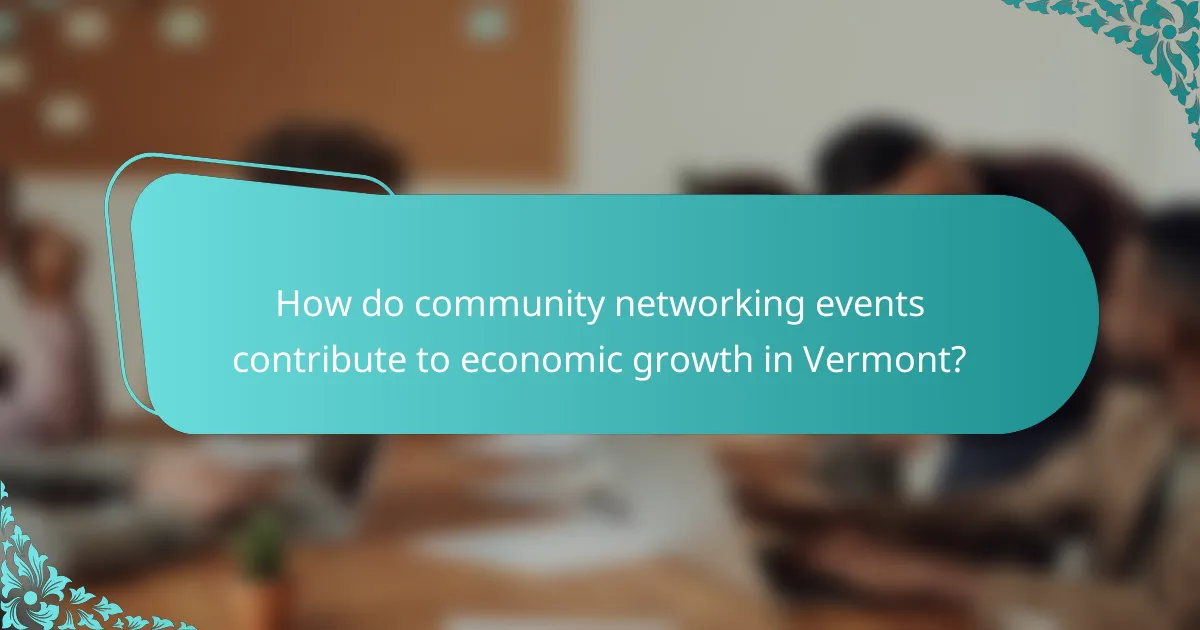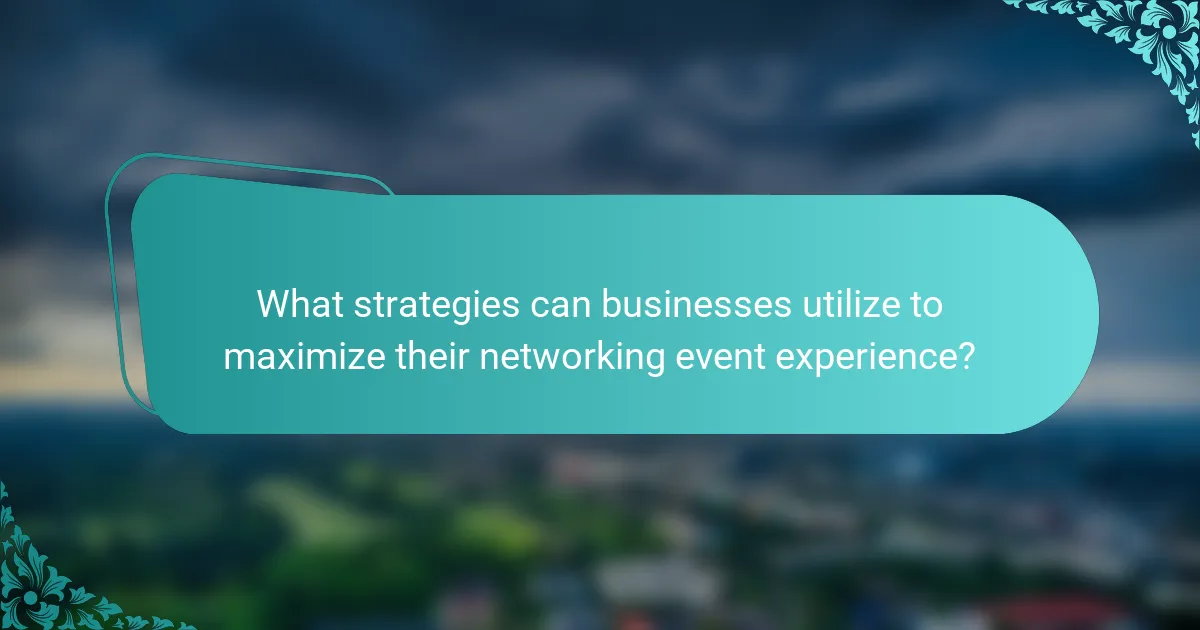The Vermont Chamber of Commerce is a nonprofit organization dedicated to supporting the business community in Vermont through resources, networking opportunities, and advocacy for beneficial policies. Established in 1918, the Chamber plays a crucial role in promoting economic growth by connecting local businesses and entrepreneurs through community networking events. These events foster collaboration, knowledge sharing, and skill development, leading to increased innovation and business expansion. Businesses that engage in networking can experience significant revenue growth and enhanced local investment. To maximize their networking experience, companies should set clear goals, prepare effectively, and maintain connections through follow-ups and social media engagement.

What is the Vermont Chamber of Commerce?
The Vermont Chamber of Commerce is a nonprofit organization that supports businesses in Vermont. It promotes economic growth by providing resources and networking opportunities. The Chamber advocates for policies that benefit the business community. It also offers training and educational programs for members. Founded in 1918, it has a long history of supporting local businesses. The organization connects members through events and initiatives. Its mission is to strengthen the Vermont economy and create a favorable business environment.
How does the Vermont Chamber of Commerce support local businesses?
The Vermont Chamber of Commerce supports local businesses through advocacy, networking, and resources. It advocates for policies that benefit the business community. The Chamber provides networking opportunities through events and workshops. These events help businesses connect with potential clients and partners. Additionally, the Chamber offers resources such as business training and information on best practices. It also provides access to a directory of local businesses. This directory facilitates collaboration among members. By enhancing visibility and connections, the Chamber strengthens the local economy.
What services and resources does the Vermont Chamber of Commerce provide?
The Vermont Chamber of Commerce provides various services and resources to support businesses. These include networking events, advocacy, and educational programs. Networking events facilitate connections among local businesses and promote collaboration. Advocacy efforts represent business interests at the state level. Educational programs offer training and resources for professional development. Additionally, the Chamber provides marketing support and access to business resources. These services aim to enhance economic growth in Vermont.
How does membership in the Vermont Chamber of Commerce benefit businesses?
Membership in the Vermont Chamber of Commerce benefits businesses by providing access to networking opportunities. These events allow businesses to connect with potential clients and partners. Members can participate in workshops and seminars that enhance their skills and knowledge. The Chamber also advocates for business-friendly policies which can lead to a better economic environment. Additionally, members receive marketing support through various channels. This exposure helps increase visibility and reach within the community. Studies show that businesses involved in local chambers often experience growth and increased revenue. Overall, membership fosters collaboration and support among local enterprises.
What role do community networking events play in the Vermont Chamber of Commerce?
Community networking events play a crucial role in the Vermont Chamber of Commerce. These events facilitate connections among local businesses and entrepreneurs. They provide opportunities for collaboration and knowledge sharing. Participants can exchange ideas and best practices that drive innovation. Networking events often feature guest speakers and industry experts. This enhances the learning experience for attendees. Additionally, these gatherings strengthen community ties and build relationships. Stronger relationships can lead to increased economic growth in the region.
What types of networking events are organized by the Vermont Chamber of Commerce?
The Vermont Chamber of Commerce organizes various types of networking events. These include business expos, luncheons, and mixers. They also host industry-specific forums and workshops. Each event aims to connect local businesses and foster collaboration. The Chamber focuses on enhancing economic growth through these networking opportunities. Events often feature guest speakers and panel discussions. This format allows for knowledge sharing and relationship building. Overall, the Chamber’s networking events support community engagement and business development.
How do these events facilitate connections among local businesses?
Community networking events facilitate connections among local businesses by providing a platform for interaction. These events encourage collaboration and partnerships among entrepreneurs. Local businesses can share resources, knowledge, and best practices during these gatherings. Networking fosters relationships that can lead to joint ventures or referrals. Participants often exchange contact information for future collaboration. Events also highlight local products and services, increasing visibility for participating businesses. According to the Vermont Chamber of Commerce, over 70% of attendees report forming new business relationships at these events. This demonstrates the effectiveness of networking in enhancing local business connections.

How do community networking events contribute to economic growth in Vermont?
Community networking events contribute to economic growth in Vermont by fostering connections among local businesses and entrepreneurs. These events create opportunities for collaboration and partnership. They enable knowledge sharing and skill development among attendees. Increased networking leads to enhanced innovation and business expansion. According to a report by the Vermont Chamber of Commerce, businesses that participate in networking events experience a 30% increase in revenue on average. This boost occurs as companies gain access to new clients and markets. Additionally, networking events promote local investment, attracting resources to the community. Overall, these events play a vital role in strengthening Vermont’s economic landscape.
Why are networking events important for economic development?
Networking events are important for economic development because they facilitate connections among businesses, entrepreneurs, and community leaders. These events create opportunities for collaboration and partnerships. They help in sharing resources and information, which can lead to innovative solutions. Networking events also provide a platform for local businesses to showcase their products and services. This visibility can attract potential customers and investors. According to a study by the National Association of Small Businesses, 70% of small businesses credit networking as a key factor in their growth. By fostering relationships, networking events contribute to a more vibrant and resilient local economy.
What impact do networking events have on local job creation?
Networking events significantly enhance local job creation. These events facilitate connections between employers and job seekers. They provide a platform for businesses to showcase their needs. This interaction often leads to immediate hiring opportunities. According to a study by the National Bureau of Economic Research, networking increases the likelihood of job placement by 70%. Furthermore, local businesses can collaborate and expand their operations through these connections. This collaboration can lead to the development of new roles and services. Overall, networking events are crucial for stimulating local employment growth.
How do networking events influence business collaborations and partnerships?
Networking events facilitate business collaborations and partnerships by providing a platform for direct interaction. These events allow businesses to meet potential partners face-to-face. They foster relationship-building through informal conversations and shared experiences. Networking events often lead to the exchange of ideas and resources. According to a study by the Harvard Business Review, 70% of jobs are found through networking. This statistic highlights the importance of connections made at such events. Additionally, participants can identify synergies that may not be apparent in a digital context. Overall, networking events serve as a catalyst for collaboration and partnership development in the business community.
What are the key outcomes of participating in community networking events?
Participating in community networking events leads to enhanced professional relationships. These events facilitate connections among local businesses and entrepreneurs. Increased collaboration opportunities often arise from these interactions. Participants can share resources and knowledge, fostering a supportive business environment. Networking events also provide visibility for businesses, helping them gain recognition in the community. Statistics show that 70% of jobs are found through networking, highlighting its importance. Additionally, attendees often discover potential partnerships that can drive economic growth. Engaging in these events can also lead to increased customer referrals and sales.
How do networking events lead to increased visibility for local businesses?
Networking events increase visibility for local businesses by facilitating direct interactions with potential customers and partners. These events create opportunities for businesses to showcase their products and services. Attendees can engage in face-to-face conversations, building trust and rapport. Networking events often attract media coverage, further amplifying exposure.
According to a study by the Harvard Business Review, networking can lead to a 25% increase in sales for small businesses. Additionally, local businesses gain access to community resources and support networks through these events. This engagement fosters a sense of community, encouraging local patronage. As a result, businesses that participate in networking events often see a measurable increase in brand awareness and customer loyalty.
What skills can business owners develop through networking events?
Business owners can develop various skills through networking events. These skills include communication, relationship building, and negotiation. Effective communication helps business owners convey their ideas clearly. Relationship building fosters connections that can lead to partnerships. Negotiation skills enable owners to reach beneficial agreements. Networking also enhances confidence in social interactions. Additionally, attendees can learn industry trends and best practices from peers. Research indicates that 70% of jobs are found through networking, underscoring its importance for business growth.

What strategies can businesses utilize to maximize their networking event experience?
Businesses can maximize their networking event experience by setting clear goals before attending. Defining objectives helps focus interactions during the event. Preparation is essential; businesses should research attendees and plan conversation starters. Engaging with others through active listening fosters meaningful connections. Utilizing social media to share insights and connect post-event enhances relationships. Following up with contacts reinforces connections made during the event. According to a study by the Harvard Business Review, effective networking can lead to increased opportunities and partnerships.
How can businesses prepare for successful networking at events?
Businesses can prepare for successful networking at events by setting clear goals. Defining objectives helps focus efforts on desired outcomes. Preparing an elevator pitch allows businesses to communicate their value succinctly. Researching attendees and their interests enables targeted conversations. Creating a follow-up strategy ensures connections are maintained post-event. Practicing active listening fosters meaningful interactions. Dressing appropriately for the event enhances professional presence. Bringing business cards facilitates easy sharing of contact information. These strategies increase the likelihood of forming valuable relationships.
What tips can help businesses effectively follow up after networking events?
Businesses should follow up promptly after networking events. Sending a thank-you email within 24 hours reinforces connections. Personalize each message to reflect specific conversations. Include any promised information or resources to add value. Utilize social media to connect and engage with new contacts. Schedule follow-up meetings to deepen relationships. Track interactions in a CRM to maintain organization. These strategies help solidify connections and foster future opportunities.
How can businesses leverage social media to enhance their networking efforts?
Businesses can leverage social media to enhance their networking efforts by actively engaging with their audience. They can create informative content that showcases their expertise. Regularly posting updates fosters relationships with potential clients and partners. Social media platforms allow businesses to join relevant groups and discussions. This participation increases visibility within their industry. Additionally, businesses can utilize targeted advertising to reach specific demographics. Analytics tools on these platforms help measure engagement and refine strategies. According to a 2022 survey, 73% of marketers believe that social media is effective for networking. These strategies collectively strengthen business connections and expand networks.
What common challenges do businesses face in networking, and how can they overcome them?
Businesses commonly face challenges in networking, including lack of time, difficulty in establishing connections, and ineffective communication. To overcome these challenges, businesses can prioritize networking by scheduling regular events. They can also leverage digital platforms to reach a wider audience. Effective communication skills can be developed through training and practice. Research indicates that 70% of professionals believe networking is crucial for career success. By addressing these obstacles, businesses can enhance their networking efforts and foster stronger connections.
How can introverted business owners navigate networking events effectively?
Introverted business owners can navigate networking events effectively by preparing in advance. They should identify key individuals they want to connect with. Researching attendees can help in creating conversation starters. Setting specific goals for each event can provide direction. Practicing introductions and small talk can boost confidence. Taking breaks during the event can help manage energy levels. Joining smaller groups or discussions can create a comfortable environment. Utilizing online networking tools before the event can ease the transition. These strategies have been shown to enhance engagement and reduce anxiety for introverts in social settings.
What strategies can help businesses maintain meaningful connections post-event?
Businesses can maintain meaningful connections post-event by implementing follow-up communication strategies. Sending personalized thank-you notes to attendees reinforces relationships. Regularly sharing relevant content via newsletters keeps connections engaged. Scheduling one-on-one meetings can deepen relationships and address specific needs. Utilizing social media platforms for ongoing interaction fosters community. Organizing post-event gatherings allows for informal networking. Collecting feedback shows that businesses value attendee opinions. These strategies enhance long-term engagement and strengthen business relationships.
The Vermont Chamber of Commerce is a nonprofit organization dedicated to supporting local businesses and promoting economic growth in Vermont. This article explores the various ways the Chamber facilitates community networking events, which play a crucial role in fostering connections, collaborations, and partnerships among businesses. It highlights the services and resources offered by the Chamber, the benefits of membership, and the impact of networking events on local job creation and economic development. Additionally, strategies for maximizing networking experiences and maintaining connections post-event are discussed, providing valuable insights for business owners seeking to enhance their networking efforts.


